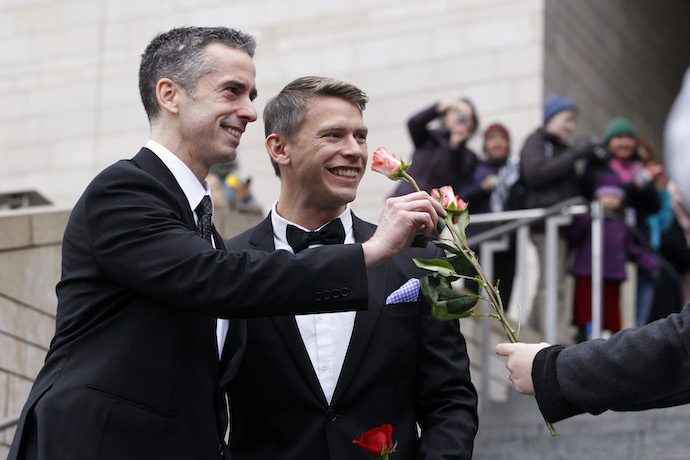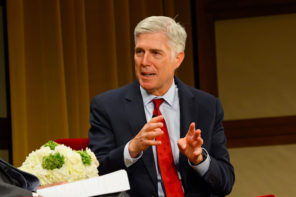Last Thursday, the Washington Supreme Court issued a significant and unanimous decision in the ongoing dispute—being litigated in courts across the country—over whether antidiscrimination law must yield to the religious beliefs of business owners opposed to marriage equality. The case involved a florist, Barronelle Stutzman, who refused to provide floral arrangements for a wedding between same-sex partners because of her deeply held religious beliefs about marriage.
In prior cases including Elane Photography, LLC v. Willock and Masterpiece Cakeshop, Ltd. v. Colorado Civil Rights Commission, courts have come down against business owners who refuse to provide goods and services for weddings between same-sex couples. Opinions in these cases have found that antidiscrimination laws are neutral, generally applicable measures that do not favor secularism over religion, or single out particular religious groups for ill treatment. The right-wing legal nonprofit Alliance Defending Freedom represented the business owners in both of those suits, and is currently representing Stutzman, who says she plans to appeal Thursday’s decision to the U.S. Supreme Court.
The opinions in Elane Photography and Masterpiece Cakeshop have declined to analyze the application of LGBT antidiscrimination laws to religious objectors using the rigorous “strict scrutiny” test. This test, used to evaluate government actions that specifically disadvantage religion, requires a law to be the least restrictive (to the religious objector) means of achieving a “compelling” government interest.
In this latest opinion, State of Washington v. Arlene’s Flowers, the court did subject Washington’s antidiscrimination law to the strict scrutiny test. They did so because the free exercise provision of Washington’s state constitution has been interpreted to be more protective of religion than the federal First Amendment, raising the possibility that the lower level of scrutiny required under the federal Free Exercise Clause may be insufficient.
While the court declined to hold that the strict scrutiny test was necessary when evaluating neutral laws under the Washington constitution, it found that applying antidiscrimination law to religious objectors satisfied even this demanding test. Importantly, the court recognized that providing exemptions for religious objectors was inherently inconsistent with the entire purpose of antidiscrimination law.
Stutzman had argued that applying the law to her could not be necessary to achieving any compelling government interest, since there was no “access problem.” In other words—since the couple could purchase flowers elsewhere, application of antidiscrimination law in this case served no purpose. In response, the court held:
We emphatically reject this argument…”[t]his case is no more about access to flowers than civil rights cases in the 1960s were about access to sandwiches.” Br. of Resp’ts Ingersoll and Freed at 32. As every other court to address the question has concluded, public accommodations laws do not simply guarantee access to goods or services. Instead, they serve a broader societal purpose: eradicating barriers to the equal treatment of all citizens in the commercial marketplace. Were we to carve out a patchwork of exceptions for ostensibly justified discrimination, that purpose would be fatally undermined.
This statement strikes at the heart of the dispute between religious objectors and LGBT couples and families. Too often, the vital role that antidiscrimination law plays in establishing the equal place of long-subordinated groups in civil society gets lost or ignored in claims that focus on the availability of flowers or cake. Efforts to limit the scope of antidiscrimination law will not stop at wedding-related services (and, indeed, a federal judge ruled last summer that the religious beliefs of a funeral home owner justified his discrimination against a transgender employee). Washington’s opinion is clear on the real purpose of these laws: guaranteeing equality, not roses.





